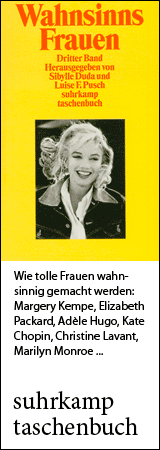Biographies Sophie Gräfin von Hatzfeldt

born August 10, 1805 in Berlin
died on January 25, 1881 in Wiesbaden
German socialist
220th birthday on August 10, 2025
Biography
The name of Sophie von Hatzfeldt, the “red countess”, is intimately linked with Ferdinand Lassalle, the German socialist, of whom she says, “We are identified in our thoughts and actions and in our lives to such a degree that his success seems to me like mine and he also is in need of me in everything.”
In 1846, when she met Lasalle, she had already endured 23 years of an unbearable marriage, arranged for financial and dynastic reasons. Married at 17 to her cousin Count Edmund von Hatzfeldt-Wildenburg she had been humiliated from the first day by her spouse, who had spurned her on their wedding night in favor of his mistress. Her later attempts to lead an independent life resulted in her husband cutting her allowance, trying to take away the children and house arrest. The countess, who through this ordeal had turned into a courageous and independent woman, was no longer willing to suffer in silence, as her family demanded. When her beloved six-year-old son Paul was kidnapped in Baden-Baden in 1838 by her husband's men, she herself snapped up the fastest horses available and after a lengthy chase got hold of him again.
In Lassalle, twenty years her junior, the countess finally finds an ally. Recognizing her fate as the expression of general social injustice he offers to help her fight for a divorce. The battle in court rages for eight long years, providing the newspapers with sensational stories.
During the revolution of 1848/49, the countess's house in Düsseldorf becomes a meeting place for revolutionaries, including Marx, who sees the Hatzfeldt trials as a symbol for the fight against the ancient feudal system. Von Hatzfeldt and Lassalle support the revolution, they are spied on, their house is searched. The countess, raised in affluence, is willing to live a simple life and to go to prison for her convictions. In 1854 Lassalle finally manages to attain a divorce with fairly generous financial provisions. The countess, however, has to give up all rights to her children.
The relationship between von von Hatzfeld and Lassalle continues to be close, though often tempestuous due to Lassalle's many lovers. In the late 1850s - still attractive in her low-cut fashionable robes - she presides over his salon in Berlin, taking part in the informal exchanges of unconventional ideas while smoking cigars like the men around her - a scandal at that time.
With Lassalle's sudden death in a duel in 1864, she loses her closest friend. However, she finds a new role as the executioner of his political will, promoting his ideas within the Allgemeiner Deutscher Arbeiterverein (ADAV), which Lassalle had founded and which was a forerunner of the German Social Democratic Party. She edits articles and election pamphlets, finances a socialist newspaper and political agitators, but soon comes up against the limits of her gender. As a woman, she is not allowed to become a member of the ADAV. Instead she repeatedly supports candidates whom she feels represent Lassalle's direction. However, they often turn away from her once they have been elected. This is a time of intense infighting in the early German workers' movement about which direction the movement should take and former allies become political opponents. Marx, who in the past had appreciated her political savvy, now resorts to calling her “the old whore Hatzfeldt.” Her supporters are denounced as “the Hatzfeld Gang”. In the end she was not able to push through Lassalle's ideas in the ADAV. Nevertheless, she left her mark on the early workers' movement and was regarded highly by many working class people.
(Text from 2004, translated by Gabriele Koch 2023)
Please consult the German version for additional information (pictures, sources, videos, bibliography).
Author: Gabriele Koch
Quotes
The countess appeals to my friendship to dedicate the next few months to her. She would certainly like me to stay in the spas. But I can't. (Mathilde Franziska Anneke)
If you stay longer, which I dare not hope, I will stay too. [...]. I wish to be as close to you as possible. Would it not be possible to board me in the same house as you? [...] Do not go away without seeing me. I beg you very, very much.
(Sophie von Hatzfeldt to Mathilde Franziska Anneke, 1865)
If you hold the rights to one or more of the images on this page and object to its/their appearance here, please contact Fembio.



